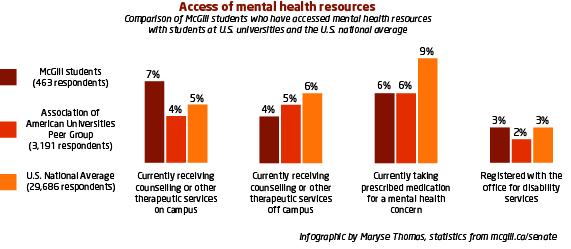Mental health at McGill was the subject of the joint Board of Governors (BoG) and Senate meeting last Tuesday.
Provost Anthony Masi spoke on the impact of mental health issues at McGill and the reason for the theme of the discussion.
“Many members of the McGill community, whether directly or indirectly, have lived with varying degrees of mental health issues and their consequences,” Masi said. “Today we focus discussion on the aspects of McGill’s environment that we can and should change in order to promote a helpful environment.”
At the meeting, Lynne McVey, executive director of the Douglas Mental Health University Institute, gave a presentation on the stigmatization of mental illnesses in both academic settings and the workplace.
“There is an increasing demand and openness to consider that mental illness can be talked about, and the stigma is beginning to lift,” McVey said. “[But] from our perspective it isn’t beginning to lift enough. People who live with mental health problems say the stigma is often worse than the illness.”
McVey called on McGill to use education to take a greater part in the fight against stigmatization.
“Seventy-five per cent [of mental health problems] are not treated, so the 8,000 we are treating at our mental health services facility here at McGill University may not just be the ones that we need to be treating,” she said. “[The] 2013 National College Health Assessment found that nearly 90 per cent of university and college students in Canada reported feeling overwhelmed by stress in the previous 12 months.”
McVey showcased the efforts of other universities in Canada to reduce stigma through education, such as the Jack Project—a mental health awareness project that includes fundraisers and awareness initiatives at Queen’s University, and “The Social Context of Mental Health and Illness,” an open, online, not-for-credit course run by the University of Toronto.
McVey also praised the efforts of Students in Mind, the first student-run conference on mental health at McGill, hosted last October.
“This level of leadership and student engagement is exactly the kind of initiative that is needed for us to increase wellbeing both on the McGill campus and in our community,” she said.
Following the presentations, members of BoG and Senate suggested ways to improve support for mental health issues at McGill. Some ideas included training teaching assistants to deal with student mental health issues and inclusion of a mental health component for Rez Project—a workshop given to all students living in residence about sexual assault, gender, and sexuality.
“There’s also the idea of creating a more positive university environment,” said Katie Larson, president of the Students’ Society of McGill University. “The message of McGill right now focuses on the idea that McGill produces the best students, which could be negative towards students’ mental health, when they internalize that competition and feel ashamed at accessing these mental health services.”
Principal Suzanne Fortier said the administration would use suggestions as a basis for future action.
“Mental health plays a very important role in our personal and professional lives, to employees, staff, students at the university,” Fortier said. “There is hardly a topic that deserves more attention than mental health [….] What’s important is not only the discussion, but also to take action.”







